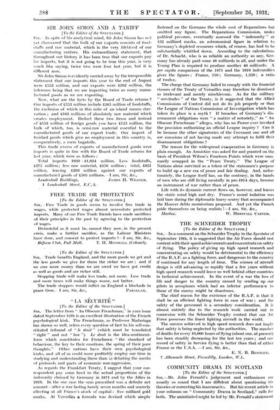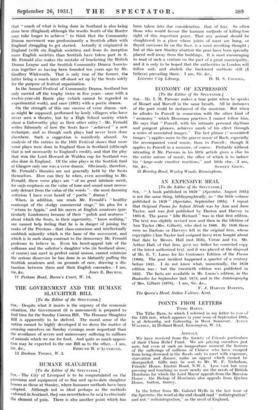COMMUNITY DRAMA IN SCOTLAND
[To the Editor of the SPECTATOR.]
SIR,—Mr. John Femald's judgement and enthusiasm are usually so sound that I am- diffident about questioning his theories or correcting his inaccuracies. But his recent article in your columns on " Community Drama in Scotland," calls for both. The uninitiated-might be led by Mr. Fernald's statement
that " much of what is being done in Scotland- is also being done here (England) although the results South of the Border may take longer to achieve " to think that the Community Drama movement was predominantly a Scottish affair with England struggling to get .started. Actually it originated in England (with six English societies) and. from its inception more English societies than Scottish have taken part in it. Mr. Fernald also makes the mistake of bracketing the British Drama League and the Scottish Community Drama Associa- tion together as having been founded ten years ago. by Mr. Geoffrey Whitworth. That is only true of the former, the latter being a much later off-shoot set up by the Scots solely for the purpose of festival organization.
In the Annual Festival of Community Drama, Scotland has only carried off the trophy twice in five yearsonce with a twelve-year-old Barrie play (which cannot be regarded as experimental work), and once (1931) with a poetic drama.
On the strength of this one success of verse drama—not, as might be supposed, performed by lowly villagers who have never seen a theatre, but by a High School . society which chose a Galsworthy play as their other entry !—Mr. Fernald writes fulsomely of how the Scots have " achieved " a new technique, and as though such plays had never been done elsewhere. Such a suggestion is manifestly absurd. An analysis of the entries in the 1931 Festival shows that more verse plays were done in England than in Scotland (although that is not necessarily to England's credit), and that the play that won the Lord Howard de Walden cup for Scotland was also done in England. Of the nine plays in the Scottish final at Glasgow only one was a verse drama. Obviously, therefore, Mr. Fernald's theories are not generally held by the Scots themselves. How can they be when, even according to Mr. Fernald, these verse plays are " of no great intrinsic merit, for suet' emphasis on the value of tone and sound must necess- arily detract from the value of the words "—the most damning criticism I have ever heard of " poetic ". drama ?
When, in addition, one reads Mr. Fernald's " healthy contempt of the stodgy commercial stage," his plea for a " return to Appia," and his sneers at English amateurs (par- ticularly Londoners) because of their " polish and neatness " about which the Scots, in their superiority, " know nothing," one cannot help feeling that he is in danger of joining the ranks of the Precious—that class-conscious and intellectually snobbish minority which is the bane of the movement, and which is in such sharp contrast to the democracy Mr. Fernald professes to believe in.. Even his 'heart-appeal tale of the milkman and the solicitor's daughter who (in Scotland alone, of course) can meet in perfect social unison, cannot minimize the serious disservice he has done in so blatantly puffing the Scottish amateurs and, on grounds of race, drawing a dis- tinction between them and their English comrades.—I am,



































 Previous page
Previous page